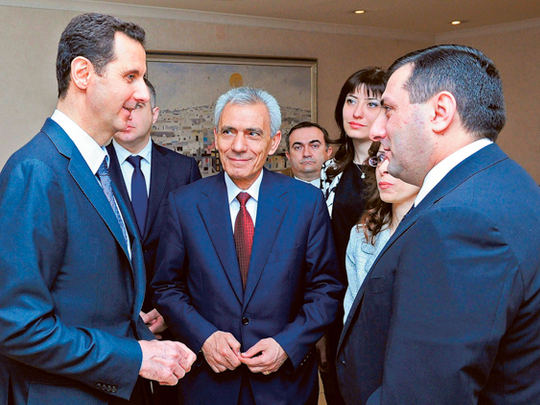
Geneva: The UN on Friday lamented the devastating violence in Syria and extended a probe into the “gross, systematic and widespread” human rights abuses in the war-ravaged country.
The 47-member UN Human Rights Council adopted a resolution extending for yet another year the mandate of a commission of inquiry that it had created in 2011.
The resolution, submitted by Saudi Arabia and Britain, also reiterated a demand that Syria “cooperate fully” with the team tasked with probing rights abuses in the country, and give it “immediate, full and unfettered access” to its territory.
The resolution was adopted with 32 votes in favour, four against, including Russia and China, and 11 abstentions.
It also deplored the frantic situation in Syria after more than three years of civil war that has killed over 146,000 people and driven millions from their homes.
The resolution “calls attention to the desperate humanitarian situation inside Syria”, stressed US representative Paula Schriefer, coming out in strong favour of the text.
It “strongly condemns the intentional denial of humanitarian assistance to civilians from whatever quarter, noting especially the Syrian government’s responsibilities in this regard”, which Schriefer slammed as a “starvation campaign”.
Syrian authorities and their allies were taken to task in the text for rights violations, including “aerial bombardment of civilian areas, in particular the indiscriminate use of barrel bombs...and other actions which may amount to war crimes and crimes against humanity”.
The resolution also expressed “grave concern at the spread of extremism and extremist groups in the country”, and called on all parties “to refrain from retaliation and violence”.
Several countries, including Russia, China and Venezuela, slammed it as biased.
Syria’s representative to the Human Rights Council said that “countries that are involved up to the neck in the killings in Syria” figured among the supporters of the resolution, pointing to Qatar, Turkey and Saudi Arabia.
The commission of inquiry, headed by Brazilian Paulo Sergio Pinheiro and including legendary former war crimes prosecutor Carla del Ponte, has repeatedly accused both sides of a range of war crimes and the regime in particular of crimes against humanity.
The team has never gained access to Syria, relying on more than 2,700 interviews in the region and from Geneva, as well as pictures and satellites for its findings.
It has drawn up a confidential list of people and groups it believes should be held accountable and has repeatedly urged the blocked UN Security Council to refer the issue to the International Criminal Court, to no avail.
In a report earlier this month, the commission decried the plight of more than 250,000 people in areas besieged by both sides.
It slammed the Syrian government’s use of siege warfare and starvation of civilians as part of its military strategy, and charged that opposition groups were also besieging and indiscriminately shelling civilian neighbourhoods.
The commission accused the jihadist Islamic State of Iraq and the Levant (Isil) especially of carrying out “mass executions” of detainees.












